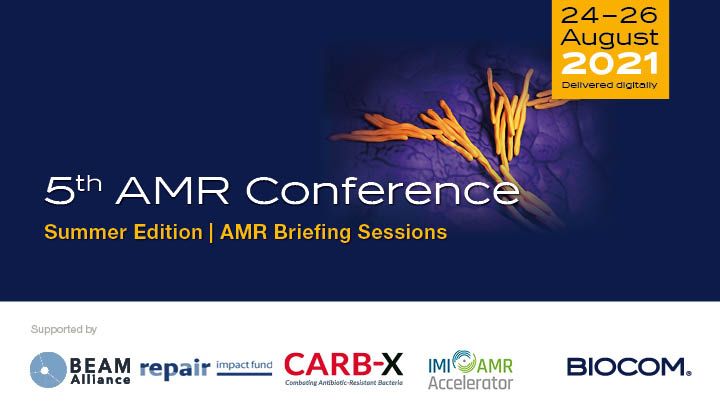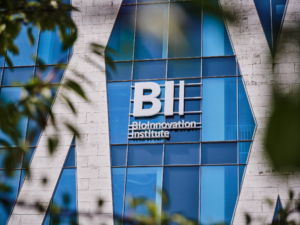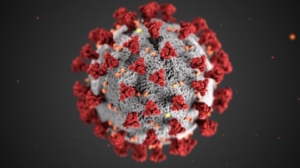
Call for pull incentives to get started
With new backing from large pharma, rising investors interest, and new incubators on stage, the AMR community is now urging policy makers worldwide to bring pull incentives into reality.
With around 30 international experts in the line-up, the virtual conference discussed the current state of the fight against antimicrobial resistance (AMR) during three Briefing sessions, which took place from 24 to 26 August under the umbrella of the 5th AMR Conference – Summer Edition. Almost 500 registered participants took part in the event to follow discussions about pandemic preparedness, the COVID-19 impact on AMR R&D, the financing climate and policy incentives. As in the previous years, the conference was organised by BIOCOM together with partners such as BEAM Alliance, CARB-X, the IMI AMR Accelerator and Novo REPAIR Impact Fund.
Overall, most of the stakeholders emphasised that there is a momentum of optimism. The level of investment is rising, interest in the field has improved and the overall trend is quite good. Particularly vaccines have found investments, said Aleks Engel from Novo Holdings REPAIR Impact Fund. For example, one of the fund’s portfolio companies Minervax attracted a €47m series B financing round in Dec 2020, which is just one example of 22 vaccine companies raising venture capital last year. Overall, Engel also underlined that there is a lot of innovation taking place in the AMR field: When we started our fund three years ago, we were embarrassed to see how many innovative companies there are, many more than we could invest in with our fund. In the meantime, many of them have developed further. Some new modalities (LBT, RNAi, phages) are only now beginning to deliver sufficiently strong data to be ‘investment grade’, he said. (read an interview with Ales Engel here)
AMR Action Fund ready for first investments until end of 2021
As agreed by the panelists, another big news for the field was the launch of the AMR Action Fund last year, backed by mainly large pharma companies. The concept of the fund has been developed in collaboration with the World Health Organization, the European Investment Bank, and the Wellcome Trust. It aims to overcome key technical and funding barriers of late-stage antibiotic development and expects to invest more than US$1bn in smaller biotech companies to support clinical development of novel antibiotic, bringing at least 2-4 candidates to market until 2030. During the conference, CEO Henry Skinner announced to now have an investment team in place, opening a European dependence soon and being ready to receive applications from companies who are dealing with phase I to III clinical trials and targeting one of the WHO-listed multi-resistant pathogens. The sweet spot would be those, being at the end of phase I and addressing a real patient need, Skinner said. According to him, the fund is open to all modalities and approaches. First investments will be announced by the end of 2021. Furthermore, Skinner made clear that the fund’s goal is also to attract further investors to the field. We have to convince others to join us. We are definitely not the only solution for the space, but must lay the groundwork for further capital to come in and bridge them in.
New European start-up incubator launched in Germany and Switzerland
During the second day, the new initiative INCATE (INCubator for Antibacterial Therapies in Europe) was launched aiming at particularly boosting the early pipeline and spin-offs in the field. According to Douglas Häggström, community manager for INCATE at University of Basel, partners from the academic, industrial and public sectors are working together to accomplish this task. The academic founding members include the German Center for Infection Research (DZIF), the research association InfectControl in Germany, the Swiss National Centre of Competence in Research AntiResist and the University of Basel. Together with four pharma companies (Boehringer Ingelheim, Roche, Shionogi and a fourth one to be announced soon), they want to ensure that the pipeline of new antibiotics is filled and strengthened. Expert advice, building of a community supporting ventures’ development and targeted funding are the three tools with which INCATE aims to achieve this goal. Besides expert advice and mentoring, we will offer a first funding of 10,000 Euros in the first stage, but will provide up to 250,000 Euros in the second stage, Häggström said. A first round of application will be started now in autumn, and first selected candidates will be announced by the end of 2021.
Cross-linking of accelerators will be key
In addition to smaller corporate initiatives such as from German biotech Aicuris, who have also selected their first three candidates for their AiCubator programme (for more infos click here) and will open another call this year, the large publicly funded accelerators CARB-X and the IMI AMR Accelerator also provided insights into their current work and status. Whereas CARB-X looked back on its first five years with more than US$343m invested in more than 90 projects, and now aiming for a next funding support from the US government, some European activities are gaining momentum. Only recently in July, another new consortium of 30 partners from 13 countries has officially launched as a new IMI AMR accelerator project. The 7-year, €185m project called UNITE4TB, aims to improve the clinical evaluation of combinations of existing and novel drugs, with the goal of developing new and highly active TB treatment regimens for drug-resistant and -sensitive TB. Being the largest public-private collaboration on TB drug development in Europe, it is also backed by the German government, among others, who provides €25m Euros to the German partners. (see press release here)
During the conference, the UK-based Infection Innovation Consortium (iiCON) was presented by its founding Director Janet Hemingway. Its initial goals are to develop, validate and operate commercial open access platforms with industry to improve product development pathways for IDTs, while acting as a catalyst for economic regional growth in infection research and development in the North West of England. iiCON is led by LSTM, its partners are Liverpool University Hospitals NHS Foundation Trust, Infex Therapeutics (formerly known as AMR Centre), Unilever and the University of Liverpool. As Hemingway underlined, COVID-19 had a huge impact of the establishment of the consortium as it provided much more funding than initially thought. "We received funding in mid-2020 as COVID hit, so we were able to rapidly pivot some of our research platforms to handling COVID instead of only focusing on AMR. At application, we had anticipated that we would leverage the £18.6m of government funding up to around £120m over five years. In reality, now we leverage up to £178m in six months", she said.
Erin Duffy from CARB-X stressed, that in the future cross-linking the different initiatives will be key to further accelerate progress in the field. We see particular potential in co-build capability science with the IMI AMR Accerlators COMBINE project, she said in view of the challenges related to the development of improved animal models of infection, the assessment of key safety risks, the evaluation of antigenic variability risks or the access to novel adjuvants. Early investment will be wasted if there is no link on the way to clinical development, she summarised.
Pull incentives in the focus
During the third day, the important role of governments and policy makers with regard to policy incentives was stressed. Having the UK pilot and the Swedish model underway, most of the stakeholders have high expectations with regard to the PASTEUR Act which was re-introduced in the US Senate in June. It is not yet done, said Thomas Cueni from IFPMA. However, he and others representing the AMR Industry Alliance such as Greg Frank, Director Global Public Policy, MSD, emphasised that only with this initiative going forward, the AMR sector may be on an improved path and better market outlook. From their perspective, a pull incentive in the US would provide a profound basis to re-establish further trust for pharma companies and investors so that the now started regained interest in the field has a long-term perspective to grow.
For most of the European-based SMEs represented by BEAM Alliance the European stakeholders are key as well. We would be pleased to see a further alignment on tools and incentives under the roof of the European Union and Commission to not end up in 27 different complex regulations, Mark Jones, Head of Project Management Office from Swiss Basilea and Board Member of BEAM Alliance stressed in the closing panel. Expectations are also high that the proposed Health emergency preparedness and response authority (HERA) in Europe and a new Horizon call targeted to pull incentives could also establish a certain spectrum of instruments in Europe for AMR-related policy activities ranging from subscription models to transferable exclusivity extension vouchers. Any pull incentive be it in Europe or elsewhere must be of sufficient magnitude, Jones said and underlined that implementation is time-critical now and needs to be appropriately designed in order to be effective. The companies pledged for a process which is transparent so that eligibility is predictable and the process manageable by SMEs as well.
In view of the most recent report of the Global AMR R&D hub which again highlighted the mismatch between global patient needs and commercial potential of AMR innovation (see for more details here) conference participants agreed that the momentum for further action on the G7 and G20 level is also there. Lots of hope was expressed that US and Europe with the UK and German governments in particular will advocate for further tangible measures in the respective countries. We have seen lots of talks and interest within those policy meetings. All facts and figures have now been put together in many reports as well. Now, it’s time to really come to measurable actions that are of relevance for the sector, Jeremy Knox, Policy and Advocacy Lead for the Drug-Resistant Infections Programme at Wellcome Trust summarised.
The next stock-taking of the field will then taking place next year when the next AMR Conference is scheduled to take place from 7 to 8 April in Basel, Switzerland.


 photo credit: BioInnovation Institute/Esben Zøllner Olesen
photo credit: BioInnovation Institute/Esben Zøllner Olesen Symeres
Symeres CDC.gov
CDC.gov